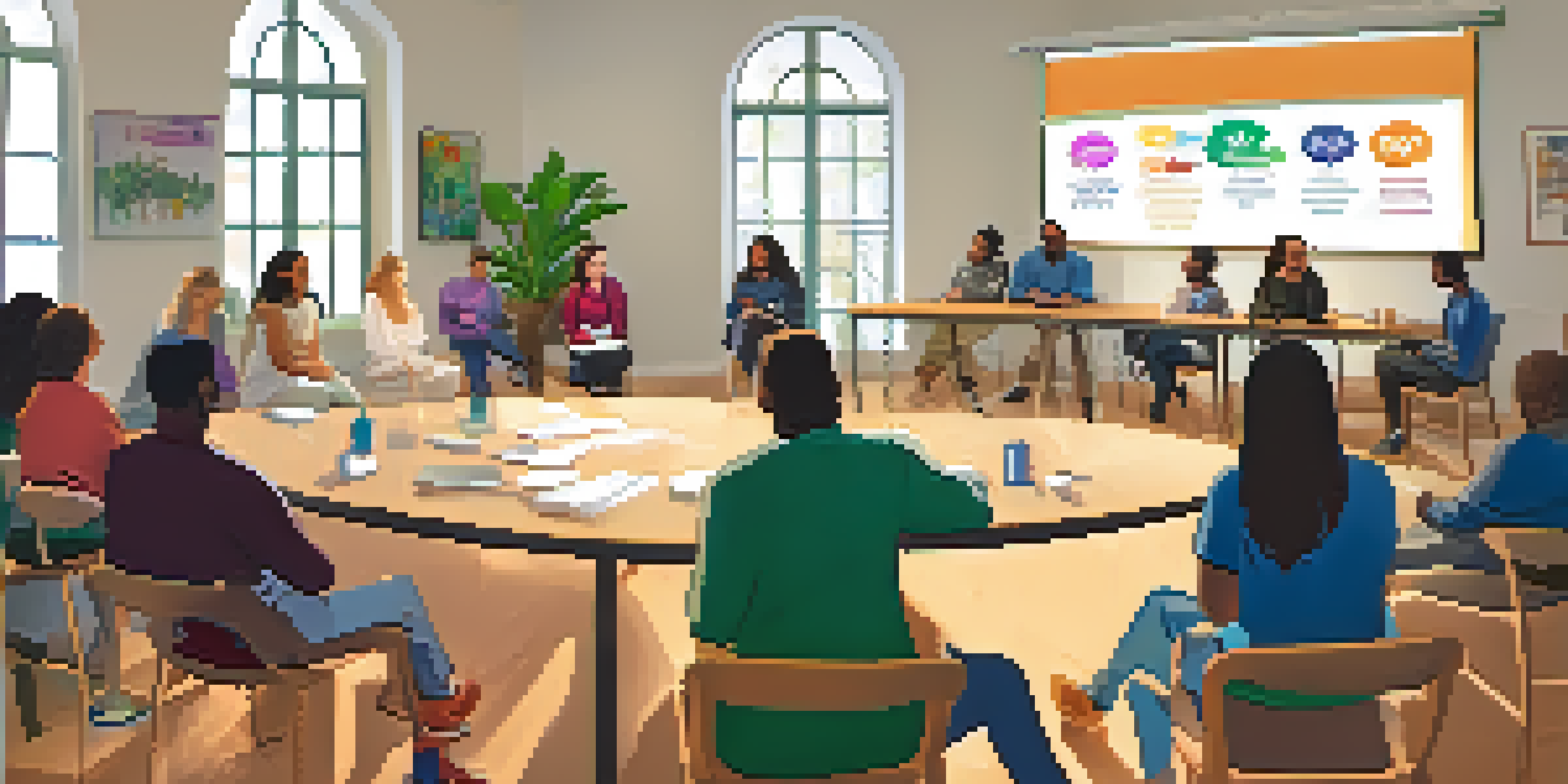Community-Based Educational Initiatives Against Addiction

Understanding Addiction in Our Communities
Addiction is a complex issue that affects individuals and families across all communities. It often stems from a mix of environmental, psychological, and biological factors. By understanding the root causes of addiction, community-based initiatives can tailor their educational programs to address these specific needs.
Addiction is a family disease. One person may use, but the whole family suffers.
For instance, local surveys can help identify prevalent substances in the area and the demographic most affected. This data-driven approach ensures that resources are allocated effectively to support those who need it the most. Education is a powerful tool in this fight, as it raises awareness about the risks and consequences associated with substance abuse.
In essence, recognizing the unique challenges within a community lays the foundation for effective educational initiatives. When communities come together to understand addiction, they can foster a supportive environment that encourages recovery and resilience.
The Role of Education in Prevention
Education plays a critical role in preventing addiction by equipping individuals with the knowledge they need to make informed choices. Programs that target schools and youth organizations can significantly reduce the likelihood of substance misuse among young people. By teaching students about the dangers of drugs and alcohol, we empower them to resist peer pressure.

Moreover, educational initiatives can utilize relatable stories and real-life examples to make their message resonate. For instance, guest speakers who have overcome addiction can share their journeys, providing both inspiration and cautionary tales. This approach humanizes the issue and makes it more tangible for young audiences.
Education is Key to Prevention
Educational initiatives empower individuals with the knowledge to make informed choices, significantly reducing the likelihood of substance misuse.
In addition, ongoing education for parents and guardians is equally important. When families are informed about the signs of addiction and the resources available, they can better support their loved ones and contribute to a healthier community overall.
Community Workshops: Building Skills and Awareness
Community workshops serve as a hands-on approach to educating individuals about addiction and recovery. These workshops can cover a range of topics, from understanding addiction and its effects to coping mechanisms and support strategies. By participating in interactive sessions, community members can engage in meaningful discussions and learn from one another's experiences.
Education is the most powerful weapon which you can use to change the world.
For example, a local community center might host a series of workshops focusing on stress management techniques, which can help individuals avoid turning to substances as a coping mechanism. These sessions can also provide participants with resources for seeking help, ensuring they know where to turn if they or someone they know is struggling.
Ultimately, these workshops foster a sense of community and solidarity. When individuals come together to learn and share, they create a supportive network that can be invaluable in the fight against addiction.
Utilizing Social Media for Outreach and Education
In today's digital age, social media has become a powerful tool for spreading awareness about addiction. Community organizations can use platforms like Facebook, Instagram, and Twitter to share educational content, highlight local resources, and engage with members in real time. This approach not only broadens the reach of their message but also encourages dialogue among community members.
For instance, a campaign featuring personal stories of recovery can inspire others to seek help. Live Q&A sessions with addiction specialists can provide valuable insights and foster an open discussion about the stigma surrounding addiction. By utilizing social media effectively, communities can create a supportive online environment that complements their offline initiatives.
Community Support Networks Matter
Establishing support networks through community programs fosters connections that are crucial for individuals on the path to recovery.
Furthermore, social media allows for the rapid dissemination of information regarding upcoming events, workshops, and support groups. By keeping the community informed and engaged, we can create a culture of awareness and prevention that extends beyond physical boundaries.
Collaboration with Local Organizations and Experts
Collaboration is key when it comes to tackling addiction through educational initiatives. By partnering with local organizations, schools, and healthcare providers, communities can pool resources and expertise to create more comprehensive programs. For example, a local health department may collaborate with schools to implement drug prevention curricula tailored to their students' needs.
Involving addiction specialists and counselors in these initiatives ensures that the information being shared is accurate and effective. These professionals can provide valuable training for educators and community leaders, equipping them with the skills needed to address addiction-related issues. This collaborative approach enhances the credibility of the educational programs being offered.
Moreover, partnerships with local businesses can help fund initiatives and provide venues for events. By working together, the community can create a unified front against addiction, demonstrating that everyone has a role to play in fostering a healthier environment.
Creating Support Networks for Recovery
Support networks are essential for individuals on the path to recovery, and educational initiatives can help establish these connections. Community programs that encourage participation in support groups, such as Alcoholics Anonymous or Narcotics Anonymous, can provide much-needed camaraderie for those struggling with addiction. These networks create safe spaces where individuals can share their experiences and learn from one another.
In addition, educational initiatives can train volunteers to serve as mentors or peer supporters. Having someone who has walked a similar path can make a significant difference in an individual's recovery journey. This support can come in various forms, from one-on-one conversations to group activities that strengthen bonds within the community.
Collaboration Enhances Effectiveness
Partnering with local organizations and experts allows communities to create comprehensive educational programs that effectively address addiction.
Ultimately, creating a robust support network is about fostering relationships built on trust and understanding. When individuals feel supported by their community, they are more likely to seek help and stay committed to their recovery.
Evaluating the Impact of Educational Initiatives
To ensure the effectiveness of community-based educational initiatives against addiction, regular evaluation is essential. By assessing the outcomes of programs, communities can identify what works and what needs improvement. This process involves collecting feedback from participants, tracking changes in substance use trends, and analyzing data related to recovery rates.
For instance, surveys can be conducted post-workshop to gauge participants' understanding and retention of information. This feedback can help refine future sessions and tailor them to better meet community needs. Additionally, tracking long-term outcomes, such as decreased addiction rates or increased attendance at support groups, provides valuable insights into the initiative's overall impact.

Incorporating evaluation processes not only enhances the effectiveness of educational programs but also demonstrates accountability to the community. When people see tangible results, they are more likely to support and engage with these initiatives, creating a cycle of continuous improvement and commitment to combating addiction.
Empowering Communities for Lasting Change
Empowering communities to take charge of their educational initiatives against addiction is crucial for fostering lasting change. When individuals feel invested in their community's well-being, they are more likely to participate in prevention and recovery efforts. This sense of ownership cultivates a culture of awareness and support, which can significantly reduce the stigma surrounding addiction.
Moreover, by providing training and resources, communities can develop their own leaders in addiction education. These leaders can advocate for necessary changes, whether it be policy reforms or increased funding for local programs. As more community members become involved, the collective impact becomes even stronger.
Ultimately, when communities unite to address addiction through education, they create an environment that promotes healing and resilience. This collaborative approach not only helps individuals struggling with addiction but also strengthens the community as a whole, paving the way for a brighter future.